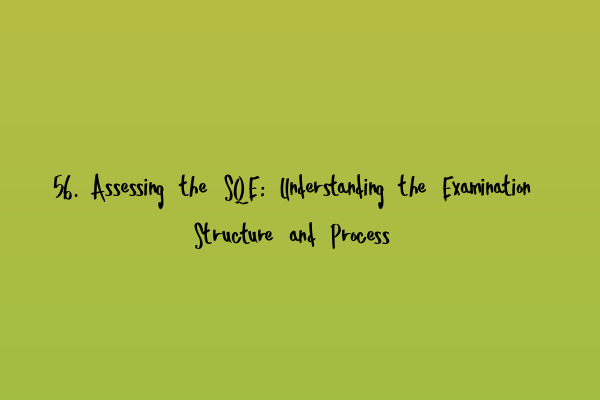56. Assessing the SQE: Understanding the Examination Structure and Process
Are you considering a career in law? Then you may have come across the Solicitors Qualifying Examination (SQE). As a future solicitor, it’s essential to understand the examination structure and process to ensure your successful entry into the legal profession. In this article, we will take an in-depth look at the SQE, its assessment methods, and how you can strategically prepare for the exam.
An Overview of the SQE
The SQE is a new assessment framework that will replace the traditional route to qualification as a solicitor in England and Wales. It aims to provide a fair and consistent measure of competence for aspiring solicitors. The examination consists of two stages: SQE1 and SQE2.
SQE1: Assessing Functioning Legal Knowledge
SQE1 is a written examination that evaluates your functioning legal knowledge across various areas of law. It consists of two assessments: multiple-choice questions (MCQs) and written tasks. This stage assesses your understanding of legal principles, application of knowledge to practice scenarios, and legal research ability. To excel at SQE1, you can practice MCQs and take mock exams to familiarize yourself with the examination format and improve your answering techniques. Click here to access SQE 1 Practice Exam Questions.
SQE2: Assessing Practical Legal Skills
SQE2 evaluates your practical legal skills through written and oral assessments. This stage focuses on six skills areas: client interviewing and attendance note/legal analysis, advocacy, case and matter analysis, legal research, legal writing, and drafting. It aims to test your ability to handle real-life legal scenarios and showcases your competence in applying legal knowledge to practice. To prepare for SQE2, enrolling in professional SQE 2 preparation courses can enhance your practical legal skills and boost your confidence. Learn more about SQE 2 Preparation Courses here.
Understanding the SQE Assessment Process
The SQE assessment process follows a rigorous but fair approach to ensure that all candidates are evaluated consistently and transparently. Let’s delve deeper into the different elements that make up the SQE assessments:
Role Plays
Role plays are part of the SQE2 assessment process. They involve simulating legal interviews or interactions with clients, witnesses, or other professionals. Through role plays, your ability to communicate effectively, gather information, and provide advice will be assessed. It’s crucial to understand the relevant legal principles and demonstrate clear and concise communication skills during these assessments.
Oral Advocacy
Oral advocacy assessments, also part of SQE2, evaluate your ability to present legal arguments and persuade an audience. You may be required to deliver an oral submission or cross-examination. Developing strong advocacy skills, including effective communication, analytical thinking, and persuasive techniques, is essential for success in this component of the examination.
Written Assessments
Written assessments form a fundamental part of both SQE1 and SQE2. These assessments range from answering multiple-choice questions and short-answer questions to drafting legal documents and providing written advice to clients. It’s crucial to practice legal writing, hone your research abilities, and improve your time management skills to optimize your performance in these assessments.
OSCEs
The Objective Structured Clinical Examinations (OSCEs) are practical assessments that form part of the SQE2 process. These examinations assess your ability to handle various legal tasks, such as conducting legal research, analyzing case materials, and drafting legal documents. The OSCEs aim to emulate real-life legal practice scenarios and test your competence in core legal skills.
Preparing for the SQE: Tips and Strategies
Now that you have a comprehensive understanding of the SQE’s examination structure and assessment processes, it’s time to focus on strategic preparation. Here are some tips and strategies to help you excel in the SQE:
1. Develop a Study Plan
Create a study plan that includes a dedicated schedule for each assessment component. Allocate sufficient time for studying, practicing past papers, and taking mock exams. This structured approach will help you cover all the necessary topics and enhance your performance in the exam.
2. Practice, Practice, and Practice
Practice is key to success in the SQE. Use resources such as MCQ practice quizzes and mock exams to familiarize yourself with the examination format and gain confidence in your answering techniques. Practice will also help you identify any knowledge gaps and areas where you need improvement. Take advantage of SQE 1 Practice Exam Questions and SQE 1 Practice Mocks FLK1 FLK2 to sharpen your skills.
3. Seek Professional Guidance
Enrolling in comprehensive SQE preparation courses can provide you with expert guidance and support throughout your preparation journey. These courses offer structured learning materials, tailored study plans, and valuable insights from experienced legal professionals. Consider investing in SQE 1 Preparation Courses and SQE 2 Preparation Courses to maximize your chances of success.
4. Review and Revise
Regularly review and revise the key topics and legal principles to ensure they stay fresh in your mind. Create concise study notes, use flashcards, or engage in group discussions to reinforce your understanding of the subject matter. The more you revise, the more confident and prepared you will feel on the day of the exam.
5. Stay Updated with Exam Dates
Keep track of the SRA SQE exam dates to ensure you don’t miss any application deadlines or examination sessions. Visit the SRA SQE Exam Dates page for the latest updates and plan your preparation accordingly.
By understanding the structure and process of the SQE and implementing effective preparation strategies, you can significantly increase your chances of success in the examination. Remember, diligent study, focused practice, and professional guidance are key to achieving your goal of becoming a qualified solicitor. Good luck!
